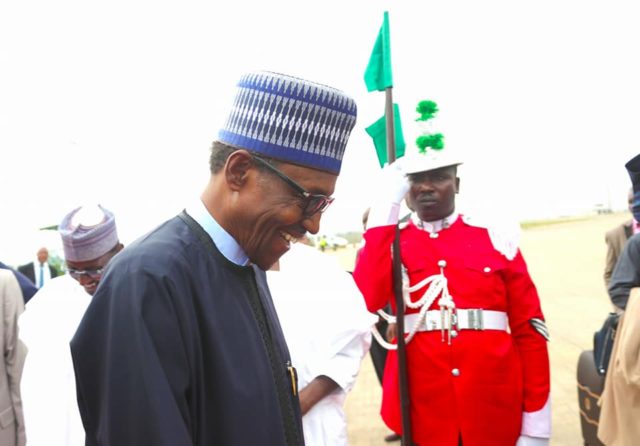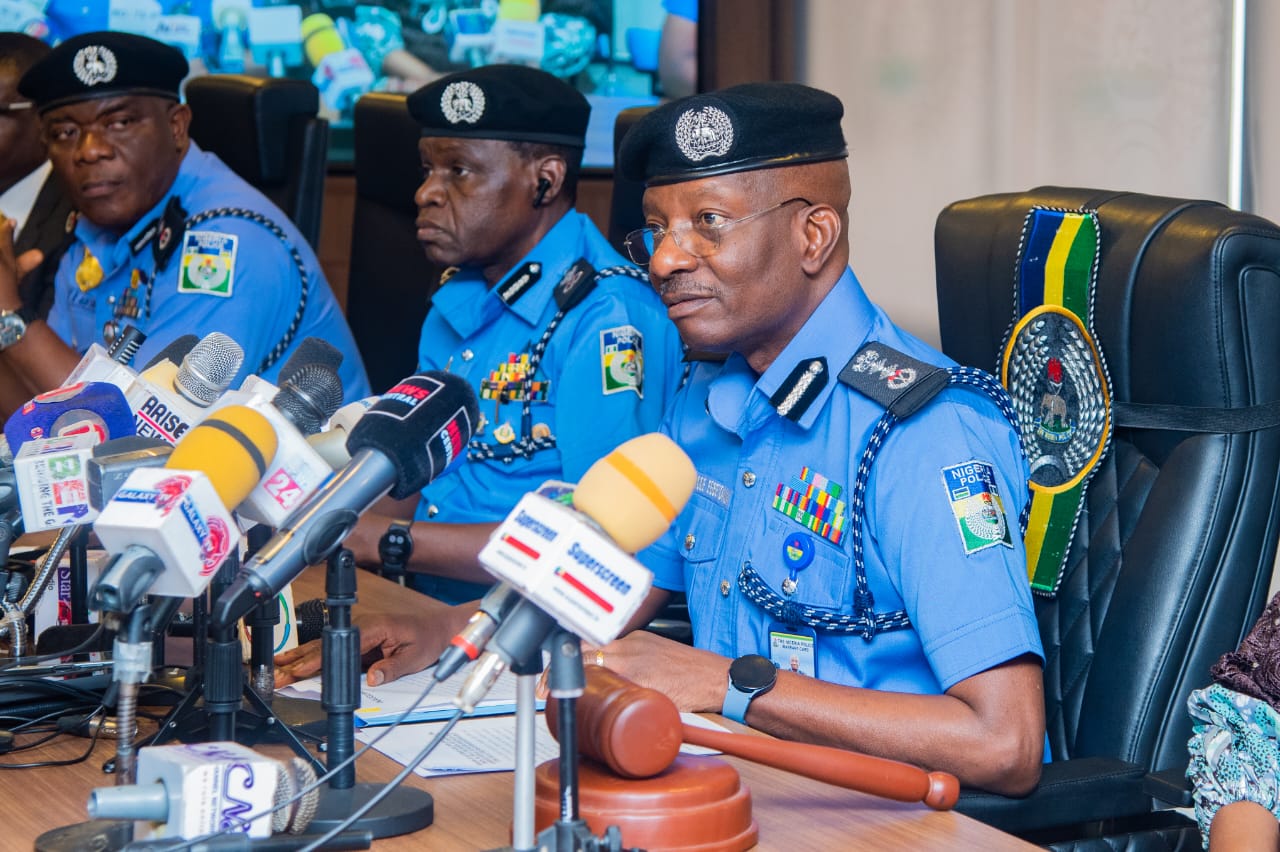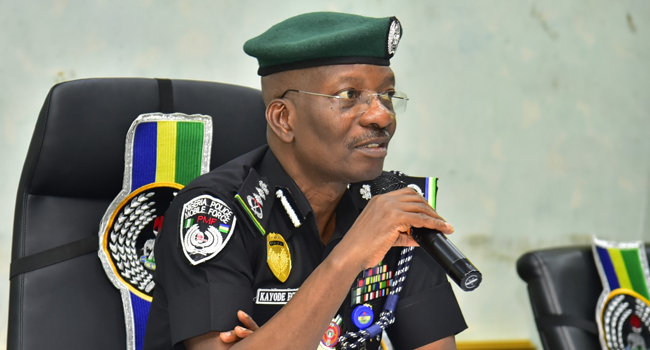More hail Buhari as Abiola, Fawehinmi families accept national honour

The families of the late Chief MKO Abiola and Chief Gani Fawehinmi (SAN) have accepted the posthumous national honours to be conferred on them by President Muhammadu Buhari on June 12, the new date set aside for the celebration of Democracy Day in Nigeria.
 In honour of the late Abiola, the presumed winner of the June 12, 1993 presidential election, Buhari on Wednesday had declared that the nation’s Democracy Day would henceforth hold on June 12 of every year as against the current arrangement where the day is celebrated on May 29.
In honour of the late Abiola, the presumed winner of the June 12, 1993 presidential election, Buhari on Wednesday had declared that the nation’s Democracy Day would henceforth hold on June 12 of every year as against the current arrangement where the day is celebrated on May 29.

The president, in addition, conferred the national honour, Grand Commander of the Federal Republic (GCFR), the highest national award exclusively reserved for presidents and heads of states in the country, on Abiola.
He also said that the late Chief Fawehinmi, renowned lawyer and human rights crusader, who was at the forefront of the battle for the actualisation of the June 12 mandate, would be conferred with the second highest honour of Grand Commander of the Order of the Niger (GCON) posthumously.

Abiola’s running mate in the election, Baba Gana Kingibe, would also be conferred with GCON on June 12, said the president.
In announcing June 12 as the new Democracy Day, Buhari said he reached the decision after due consultations.
The June 12, 1993 presidential election was cancelled by the military regime of Gen. Ibrahim Babangida on June 23, 1993, for no tangible reason, forcing Abiola to fight for the actualisation of his mandate.
However, Babangida’s successor, the late Gen. Sani Abacha, detained Abiola until his (Abacha) death on June 8, 1998.
Abiola died under suspicious circumstances while in custody on July 7, 1998, just as negotiations were ongoing between leaders of the National Democratic Coalition (NADECO) and the successive military regime led by Gen. Abdulsalami Abubakar for his release.

According to Buhari, June 12 was the day Nigerians freely exercised their democratic rights and voted for Abiola.
Expressing their gratitude to the president for immortalising Abiola, the family said Thursday that the posthumous conferment of GCFR on him (Abiola) was the only befitting recognition for his fight for democracy in Nigeria.
In a letter to Buhari written by the scion of the Abiola family, Kola Abiola, he expressed the family’s appreciation to the president.
The letter said: “On behalf of the wives, children and grandchildren of late Bashorun Moshood Kashimawo Olawale Abiola, I am writing to formally express our sincere appreciation to you for conferring him with the National Honour of Grand Commander of the Federal Republic (GCFR) and designating June 12 as Democracy Day in Nigeria going forward.

“Your Excellency, as I wrote in my letter to you on June 12, 2016, in our minds, the award was the only befitting recognition of the importance of Chief Abiola’s fight for democracy for Nigeria which culminated in four years in incarceration/solitary confinement and decimation of his business and financial interests, before the ultimate sacrifice, being his life on July 7, 1998 at the age of 60.
“Your Excellency, your decision to also designate June 12 as Democracy Day rights the wrong done to all the nation-builders and heroes that produced the democratic credentials on which the Nigerian polity now thrives.
“We are profoundly grateful to the people from all corners of Nigeria that worked tirelessly to ensure the most free and fair elections in our nation’s history in 1993, fought valiantly for the Hope ‘93 mandate given to Bashorun Abiola by the Nigerian people and died trying to protect the mandate.
“Mr. President, I thank you earnestly for heeding our plea where others before you did not, whilst conveying the assurances of my highest esteem.”
Abiola’s daughter, Hafsat, waxes Lyrical
Similarly, Abiola’s daughter, Mrs. Hafsat Abiola-Costello, Thursday commended the federal government for the recognition accorded her father.
For Hafast, this honour came barely 24 hours after she was appointed executive president of Women in Africa (WIA) initiative, a network of women across Africa and the world with strong ties with companies and organisations, especially in Europe and dedicated to economic development.
While bashing former President Olusegun Obasanjo for practically ignoring the legacies of Abiola, she said: “The struggle to actualise the #June12 mandate was MKO’s opportunity to show how much he loved and believed in Nigerians and Nigeria. I am simply glad that his commitment held through all the difficulties. He has played his part. We must do no less.”
She also wrote a poem which she shared via Twitter to chronicle the journey she tagged: “Twenty-five Years after June 12: Our Long Wait for Justice is Ending.”
She wrote: “I had expected that the handover from military rule to democracy would be held on the 12th of June. That would have signalled the completion of a circle that began with a dream deferred. That became one fulfilled but I waited in vain.
“The handover was set for May 29, a date pulled out of thin air, signifying nothing. Then I thought that the chief beneficiary would ask the country to observe a minute of silence in memory of MKO, Kudirat, Alfred Rewane, Umaru Yar’Adua, Bagauda Kaltho, the thousands of students, the tens of journalists, traders and politicians who lost their lives fighting to actualise an unjustly annulled election.
“Again, I waited in vain for he started his inauguration speech and nothing was said.
“The first four years passed and it became clear that the goal was to erase the name of the man whose sacrifice paved the way for our democracy. Those four years set the tone.
“And I got tired of waiting, as it slowly became clear that to wait was to wait in vain.
“I stopped expecting my country to do the right thing by my father and instead began to understand why Nigeria struggles to find patriots among its leaders.
“Until when President Muhammadu Buhari gave an executive order to declare that June 12 was Nigeria’s Democracy Day; to confer on MKO the title of GCFR, an honour reserved for presidents of the Federal Republic of Nigeria.
“To confer on Gani Fawehinmi, the dogged fighter for justice, and my father’s running mate, Babagana Kingibe, the title of GCON, the second highest in the land.
“And in one day, demonstrated to my bruised heart that integrity, fairness, honour were alive and well in a country for which both my parents had sacrificed their lives.
“There are no words that can capture the depth of my gratitude nor the breadth of my joy. I thank God that I am alive to witness this day.
“May we live to witness many more days when justice triumphs over injustice, when sacrifice and service win over arrogance and fraud, and when the blood of our heroes reach from across time to boldly claim the reward that their actions wrought.
“May the sacrifices of our past heroes and heroines never be in vain.”
Fawehinmi family accepts Award
Just like the Abiolas, the family of late human rights activist, Chief Gani Fawehinmi, Thursday thanked the federal government for its decision to give their patriarch a national award.
Fawehinmi, a fiery activist and an uncompromising believer in the rule of law and democratic governance, was arrested, incarcerated and charged to court several times by successive military regimes.
He died at the age of 71 on September 5, 2009 after a prolonged battle with lung cancer.
During his illness, he rejected the national honour, Order of the Federal Republic (OFR) – in protest of the many years of misrule since Nigeria’s independence.
However, Thursday, the first son of the late lawyer, Mr. Mohammed Fawehinmi, expressed the family’s gratitude in an interview with the News Agency of Nigeria (NAN) in Lagos.
Mohammed said the family accepted the honour bestowed on his late father and thanked Buhari for the recognition.
“We thank the federal government for the honour, we appreciate it and we accept it.
“We also thank the government for recognising the June 12 struggle. We thank the president for the honour,” he said.
Mohammed added that his late father deserved the honour, having fought hard for justice and democracy while he was alive.
He dismissed the perception in some quarters that his father would have rejected the award if he was alive.
Mohammed said his father rejected the OFR national honour because it was undeserving.
“My father would not have rejected this award. He rejected the OFR award given to him because it was not deserving,” he said.









